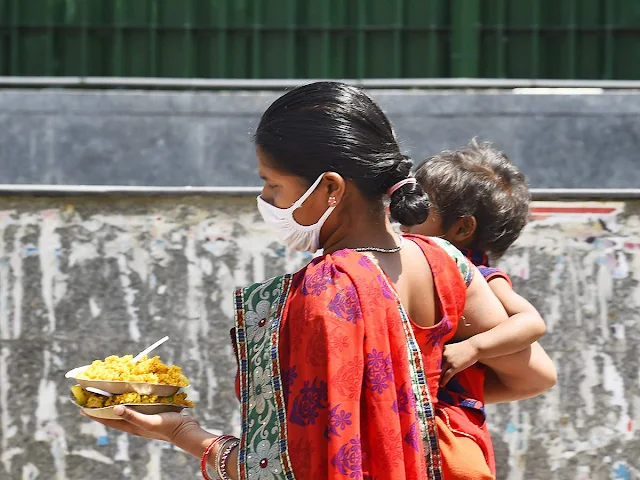A fresh survey of Ahmedabad’s low income households under the directions of Indian Institute of Management-Ahmedabad (IIM-A) faculty Prof Ankur Sarin has revealed that, during the current lockdown, around 85% households reported not earning regular incomes anymore as against 76% households during an earlier survey. The survey was carried out between April 23 and May 2, while the previous round took place between March 24 and April 22.
Survey results show that most households have lost their monthly incomes (in the range of Rs 10,000 to Rs 15,000 for a large section) and expressed anxiety about their ability to pay rent, school fees, telephone and electricity bills, etc.
Survey results show that most households have lost their monthly incomes (in the range of Rs 10,000 to Rs 15,000 for a large section) and expressed anxiety about their ability to pay rent, school fees, telephone and electricity bills, etc.
A note prepared by Prof Sarin on the survey said, “Households continued reporting not having the means to procure basics like ration, milk, vegetables, toiletries etc.” About 90% of the households who were surveyed had their monthly median income of Rs 19,000 before the lockdown.
Survey results further show that around 54% respondents said that the number of meals their families were consuming per day have reduced since the lockdown, adding, around 60% of respondents said their current food supply would last them less than a week’s supply of food, and 20% said food supplies would last for up to two weeks, and 8% said these would last for up to four weeks.
During the previous survey, 44% of respondents said their current food supply would last them less than a week’s supply of food, while 19% said it would last for up to two weeks, and 12% said it would last for up to four weeks.
“Food supply is there but all is being purchased through credit. So as long as people lend, we will survive”, respondents are quoted as saying in the latest round of survey, adding, they are “managing” things with the help of “neighbours”.
Survey results further show that around 54% respondents said that the number of meals their families were consuming per day have reduced since the lockdown, adding, around 60% of respondents said their current food supply would last them less than a week’s supply of food, and 20% said food supplies would last for up to two weeks, and 8% said these would last for up to four weeks.
During the previous survey, 44% of respondents said their current food supply would last them less than a week’s supply of food, while 19% said it would last for up to two weeks, and 12% said it would last for up to four weeks.
“Food supply is there but all is being purchased through credit. So as long as people lend, we will survive”, respondents are quoted as saying in the latest round of survey, adding, they are “managing” things with the help of “neighbours”.
Respondents also said, they their meal reduced “from three meals a day to once a day”, that they “only eat in the afternoon”, that they were “eating just one time day”, and so on.
Then, only 64% (as against 66% households in the previous survey) of households said they had collected ration for the month from fair price shops, even though over 85% claimed to have a ration card for the place they were currently residing in.
Then, only 64% (as against 66% households in the previous survey) of households said they had collected ration for the month from fair price shops, even though over 85% claimed to have a ration card for the place they were currently residing in.
Researchers, who carried out the survey, made 50+ calls daily. Claimed Prof Sarin, “The status of these households is indicative of the likely situation being faced by at least half of the over six million population residing in Ahmedabad.” However, added a researcher, "Given that the sample we reached out in this round was slightly more disadvantaged, it's not strictly statistically comparable."
Among those who had ration cards gave several reasons why they were unable to access food, such as ration shops in their vicinity were shut, had low supply of grains, or were overcrowded. The survey quoted respondents as stating that they are “denied” ration for second time, are asked to come after May 15, collect ration after 2-3 days, with shop owner stating that he hasn’t received “adequate” food supply.
Then, said the survey, some households claimed to have received less than promised quantity, with respondents stating that “one day we received only 3 kg dal, 1 kg rice and some oil and nothing after that.”
“Around 46% reported having a Jandhan account”, the IIM-A note said, adding, “Among those who had an account, around 50% reported being aware of money transfers from the government to their accounts.”
While the government is seeking to promote cashless payment methods during the Covid-19 pandemic, the note said, most households did not have “digital wallets like Google Pay, Paytm, Bhim or Phone Pe making immediate transferring of funds difficult.”
Then, said the survey, some households claimed to have received less than promised quantity, with respondents stating that “one day we received only 3 kg dal, 1 kg rice and some oil and nothing after that.”
“Around 46% reported having a Jandhan account”, the IIM-A note said, adding, “Among those who had an account, around 50% reported being aware of money transfers from the government to their accounts.”
While the government is seeking to promote cashless payment methods during the Covid-19 pandemic, the note said, most households did not have “digital wallets like Google Pay, Paytm, Bhim or Phone Pe making immediate transferring of funds difficult.”



Comments